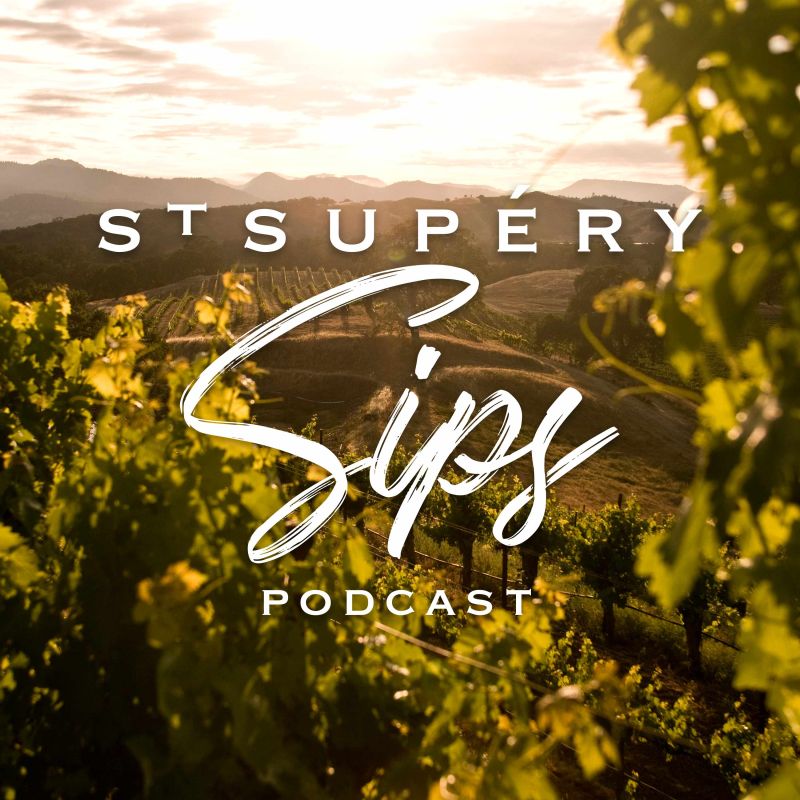Related Articles


St. Supéry Sips Episode 7: All About Rosé
July 12, 2022

Podcast Episode
St. Supéry
June 14, 2022
St. Supery Sips Episode 6, Part 1
Celebrating Sustainable Seafood with Chef Kyle Connaughton
As the holder of Napa Green certifications for its vineyards and winery, St. Supéry is deeply committed to sustainability. This is true not only in the vineyards and winery, but also on the dinner plate. Just as sustainably farmed grapes are the basis for its estate-grown wines, St. Supéry seeks out sustainable seafood for the winery’s culinary program and highlights responsible purveyors through its annual Great Sustainable Seafood Tour.
In the latest episode of the St. Supéry Sips podcast, winery CEO Emma Swain chatted with Kyle Connaughton, chef and co-owner at SingleThread Farms in Healdsburg, about the importance of sourcing sustainable seafood in restaurants, and supporting responsible purveyors.
SingleThread holds three Michelin stars as well as a Michelin Green Star, which recognizes restaurants that set the bar for sustainable practices. Along with growing its own organic produce for the restaurant, SingleThread adheres to strict seafood sustainability protocols.
“It’s really about looking at what is first and foremost in season and has the high quality that we expect,” Connaughton said of the restaurant’s seafood sourcing practices. “Behind that is knowing the fisheries, knowing their practices and being able to speak to the sustainability of that seafood.”
That involves developing close relationships with suppliers and taking time to visit the fisheries, whether they are located in California or Japan. Additionally, SingleThread communicates with its market representative in Tokyo each day to make sure that the seafood they are purchasing is handled in the right way.
Connaughton lived in Japan for many years and attended culinary school there. During that time, he got to know members of the local fishing community and learned about their practices. Working in sushi restaurants in Japan, he gained insights about seafood sourcing.
More recently, Connaughton has become interested in Japanese seafood purveyors who are using modern technology to flash-freeze fish at ultra-low temperatures, and then transport it to export markets by boat.
“It’s not only sustainability in terms of the sea, it’s sustainability in terms of the lowering the carbon footprint of the transport,” said Connaughton. “Those are two separate but very important things. It’s really exciting to see what’s going on with that.”
For chefs and restaurant owners, it’s not just about changing the way they think about seafood. It’s also about retraining themselves in how to talk to guests about it. Instead of emphasizing how recently the fish came off the boat, chefs have the opportunity to inform diners about modern processes that are more sustainable and do not impact the quality of the fish.
For example, telling guests, “We have to look at how we’re going to get high quality fish produced in a sustainable way—going through a rapid deep-freezing process that’s not going to allow ice crystal formation in the fish,” Connaughton said. “And then we’re going to transport it in a way that is much more environmentally sound.”
Chasing Traceability
Connaughton acknowledged that while traceability is important in seafood sourcing, it’s not always easy. Some purveyors mislabel fish, and seafood provenance can be murky. It takes extra vigilance on the part of the buyer to find out what is really happening.
“It’s a very challenging world,” he said. “The way that I have decided to navigate this is to go and see it for myself. And I try to eliminate as many people in between the fish and me as I possibly can, because then I know what the cold chain is.”
Unfortunately, this is not a realistic approach for most restaurants, he added, and the industry needs better systems for traceability. The best strategy is to develop relationships with reliable seafood companies and inquire about sustainability protocols.
“You have to be asking the questions and you have to be checking in,” said Connaughton. “And if you don’t know what your protocol should be, you really have to be having that conversation with your seafood supplier.”
This is somewhat trickier when dealing with international purveyors who are economically motivated to deprioritize sustainability. Change will eventually come, said Connaughton, as more chefs and restaurants choose to buy from responsible fisheries.
“Every time we make a good purchasing decision we’re allowing and facilitating a good food system to continue forward, and we’re taking resources away from a bad food system,” he said. “It’s really as simple as that.”
Expanding Options
Another step forward in sustainability is for restaurants—particularly high-profile establishments that tend to set trends for the rest of the industry—to champion less-popular seafood species and expand their menus beyond overfished bluefin tuna. This will require chefs to educate guests about these ingredients and why the restaurant has chosen to serve them.
“I think a big trend is that chefs are saying, ‘Let’s broaden our horizons, let’s dig a little bit deeper. Let’s really understand some seafood that we want to call attention to, and [recognize] good fisheries and systems. Let’s do the work to have really creative dishes and then we’ll take on the [effort] educate the guests about that.’ It’s not one of the more sexy food trends, but this is a trend about responsibility.”
For more on chefs and sustainability, check out Part 2 of this episode, which features Stuart Brioza, chef and co-owner at San Francisco’s State Bird Provisions, The Progress, and The Anchovy Bar.
You can also listen to previous podcast conversations with sustainable aquaculture champion Jennifer Bushman and Oceans 2050 co-founder Alexandra Cousteau.
# # #
Check Out These Sustainable Seafood Recipes
June 14, 2022